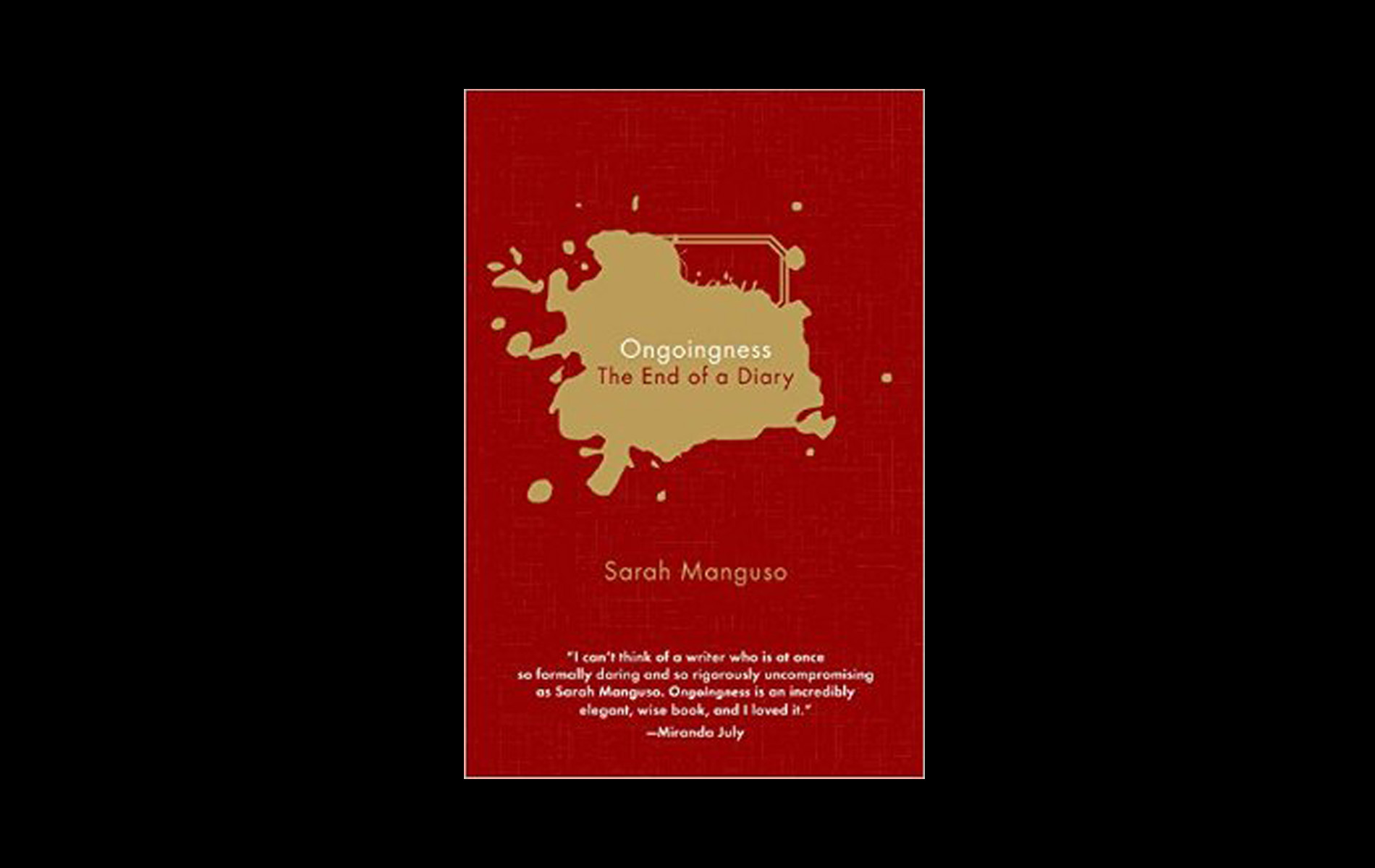A voracious diary-keeper confronts her need to record every moment.
by Kinzy Janssen
If someone had handed me a copy of Sarah Manguso’s Ongoingness: The End of a Diary and said “Here, read this. It’s about time and mortality,” I would have balked. I didn’t like thinking about time or mortality. Did I? Plus, it seemed too grandiose a concept to pin down in 88 pages—pages that sometimes only contained one or two sentences apiece.
I’m glad I cracked the cover. Manguso’s reflections swept forward like a flood, somehow covering vast territory and then retreating, leaving a changed landscape in their wake.
Part memoir, part philosophical essay, Ongoingness (released March 3 by Graywolf Press) opens with Manguso telling us she’s kept a diary for 25 years. At some point, she transcribed the notebook pages into a Word doc and has been journaling in Word ever since. Now, by re-reading the 800,000-word record, she’s able to notice shifts in writing style and content. As she examines her changing approaches to the page, what she’s really examining is her relationship with time itself—as a teenager, a twenty-something, and now, as a mother approaching 40.
At nine years old, diary-keeping didn’t appeal to her at all—and there’s a reason for that. “I wasn’t yet aware of how much I was forgetting,” she writes. But as she entered late adolescence, Manguso started finding herself in “moments that were too full” – moments that may strike the reader as commonplace – like the night she “held a plastic cup of wine and stood in front of a painting next to a friend [she] loved.” At the end of each day, sometimes twice a day, she needed to go home and “empty the reservoir” right away. The need was especially feverish after each of her sexual encounters. Otherwise, she might forget them, and those moments would die.
Habitual diary-keepers will identify with the way Manguso refers to the practice not as something requiring discipline, but as a compulsion, a matter of hygiene, an emergency. She even refers to it as a vice, having opted at times to stay home and accurately record her recently-lived moments rather than seek out new ones. She even revised the entries, trying to create the most accurate record of her life as possible. “I wrote it to stand for me utterly,” she says.
Now in her late 30s, she writes less—that is, less frequently and with fewer words—and she’s candid about why that is. Simply put, fewer things she’s reading or looking at or hearing nowadays fall into the category of “extraordinary” and thus don’t need recording. In the middle of her life, married, she’s less interested in “short tragic love stories” because they glorify both beginnings and endings. Now, what interests her is “the kind of love to which the person dedicates herself for so long, she no longer remembers quite how it began.”
This is what she means by “ongoingness.” Beginnings and endings—including our own births and deaths—are illusory because time stretches in both directions without our participation. Being aware of ongoingness means she no longer has to name the things that have changed since yesterday.
Halfway through the book, Manguso gains two more perspectives, that of a pregnant woman and mother. “The partly made flesh wriggling inside me was already mortal,” she writes. Observations like these are deceptively simple. Once read, the statements seem obvious, but I am also certain that I’ve never thought them consciously or read them concretely. Statements like: “In a hundred and fifty years no one alive will ever have known me. Being forgotten like that, entering that great and ongoing blank, seems more like death than death.”
In the second half of the book, she notices her diary is mostly about her infant son. Initially, I (a woman who has yet to give birth) felt uncomfortable with what I saw as self-erasure. Her confession (is it a confession if she’s not ashamed of it?) reminds me of my friends who are parents—how their Facebook avatars have been replaced by their sons and daughters. Yet she also extols the power that comes with motherhood. Of nursing, she writes: “I am no longer merely a thing living in the world; I am a world.”
Her writing is bold, yet doesn’t feel exaggerated. And while some insights in Ongoingness are chilling, and others revelatory, they all constitute a lucid look at how we move through time, including how and why we record it. My favorite piece of Manguso wisdom is this:
“My life felt full before I became a mother, but I’ve found that trying to say that I prefer having the baby to not having him sounds aggressive…Maybe the trouble is that the shape of life is elastic, that it can feel and be full at variable levels of fullness.”
I would argue that books are elastic, too. Especially this one. Despite being a short, thin book (literally), with lots of white space on each page (literally), Ongoingness is very, very full.
[hr style=”striped”]
Kinzy Janssen is The Riveter‘s associate editor. You can follow her @KinzyJ.




